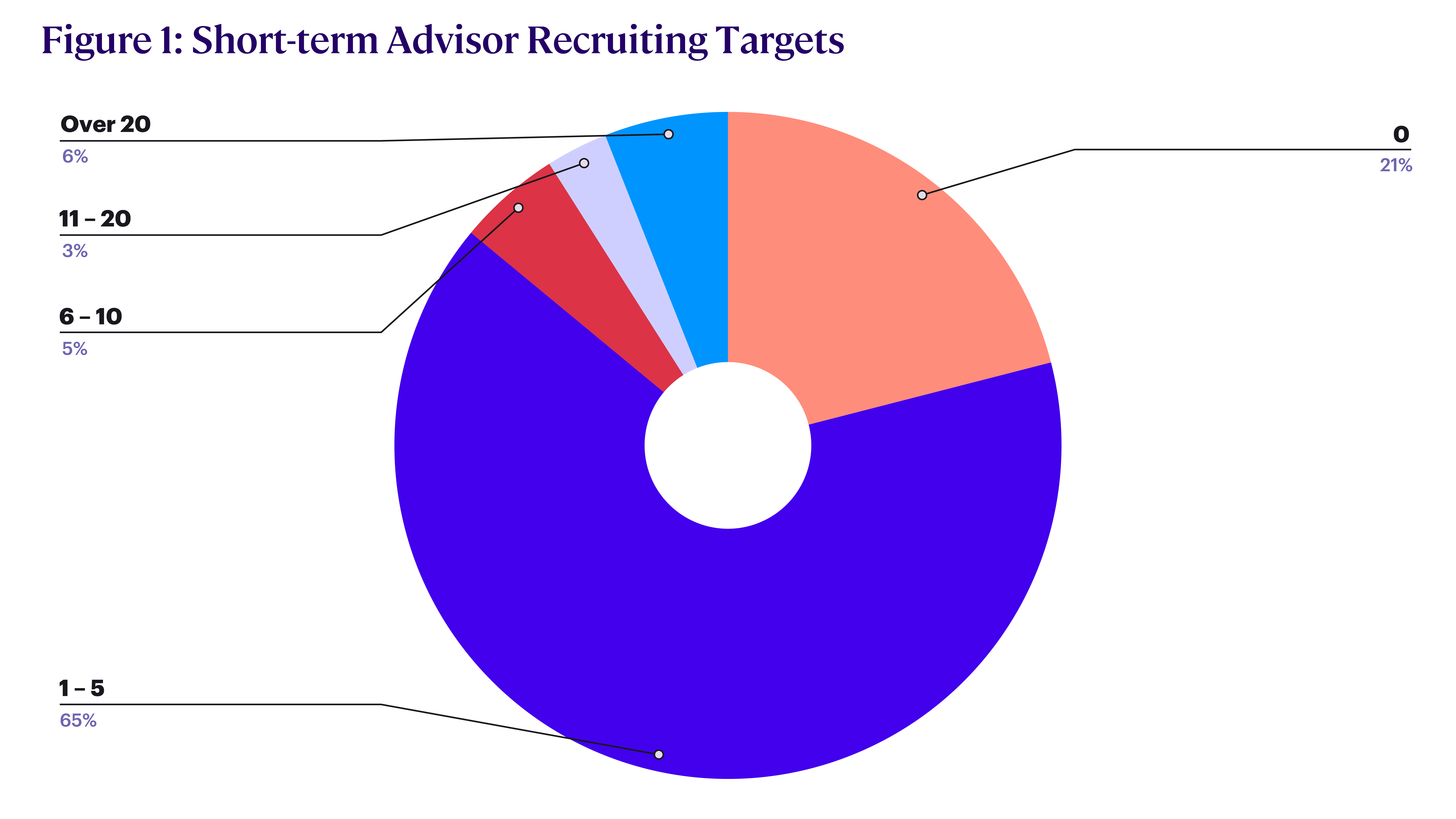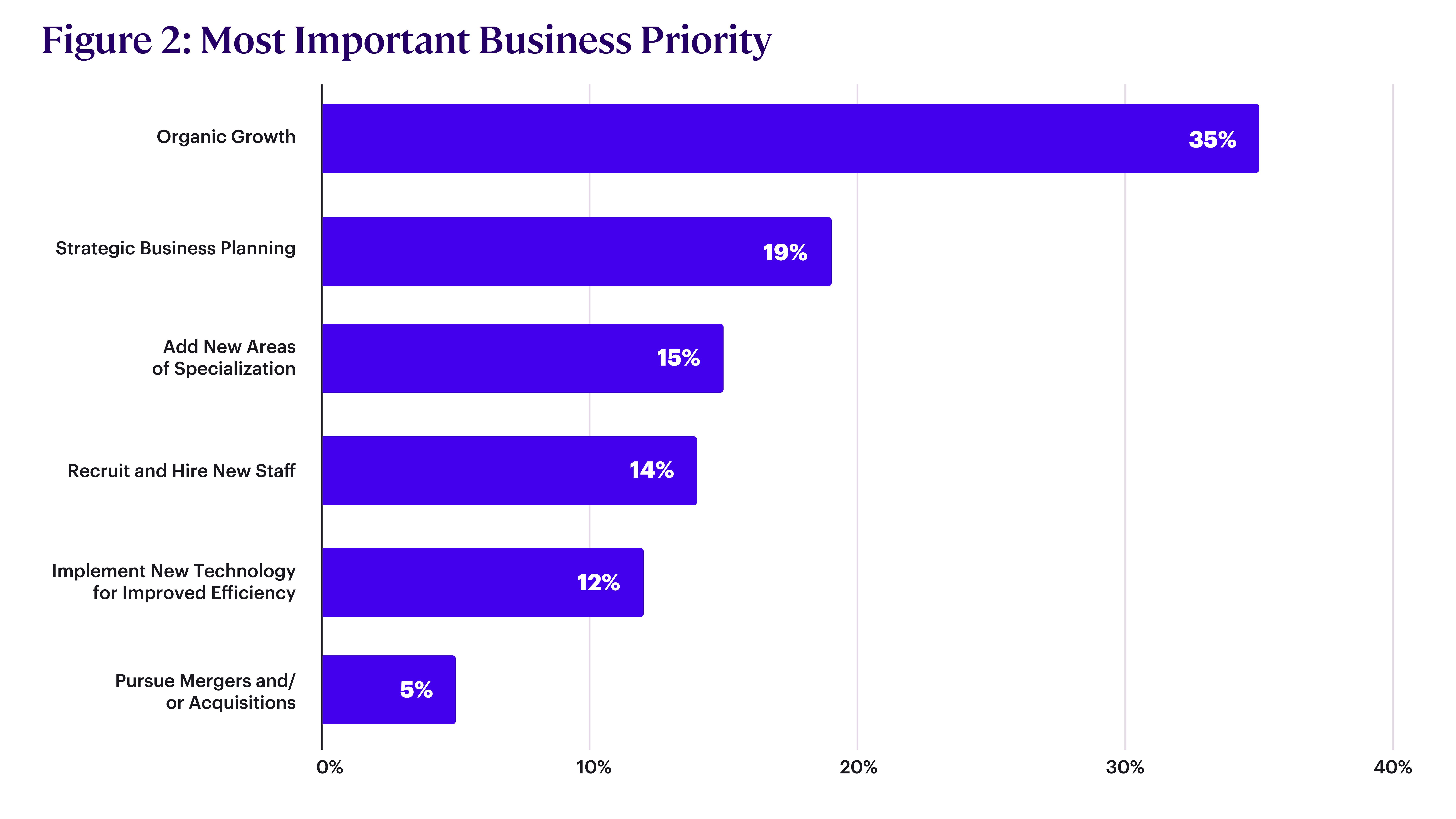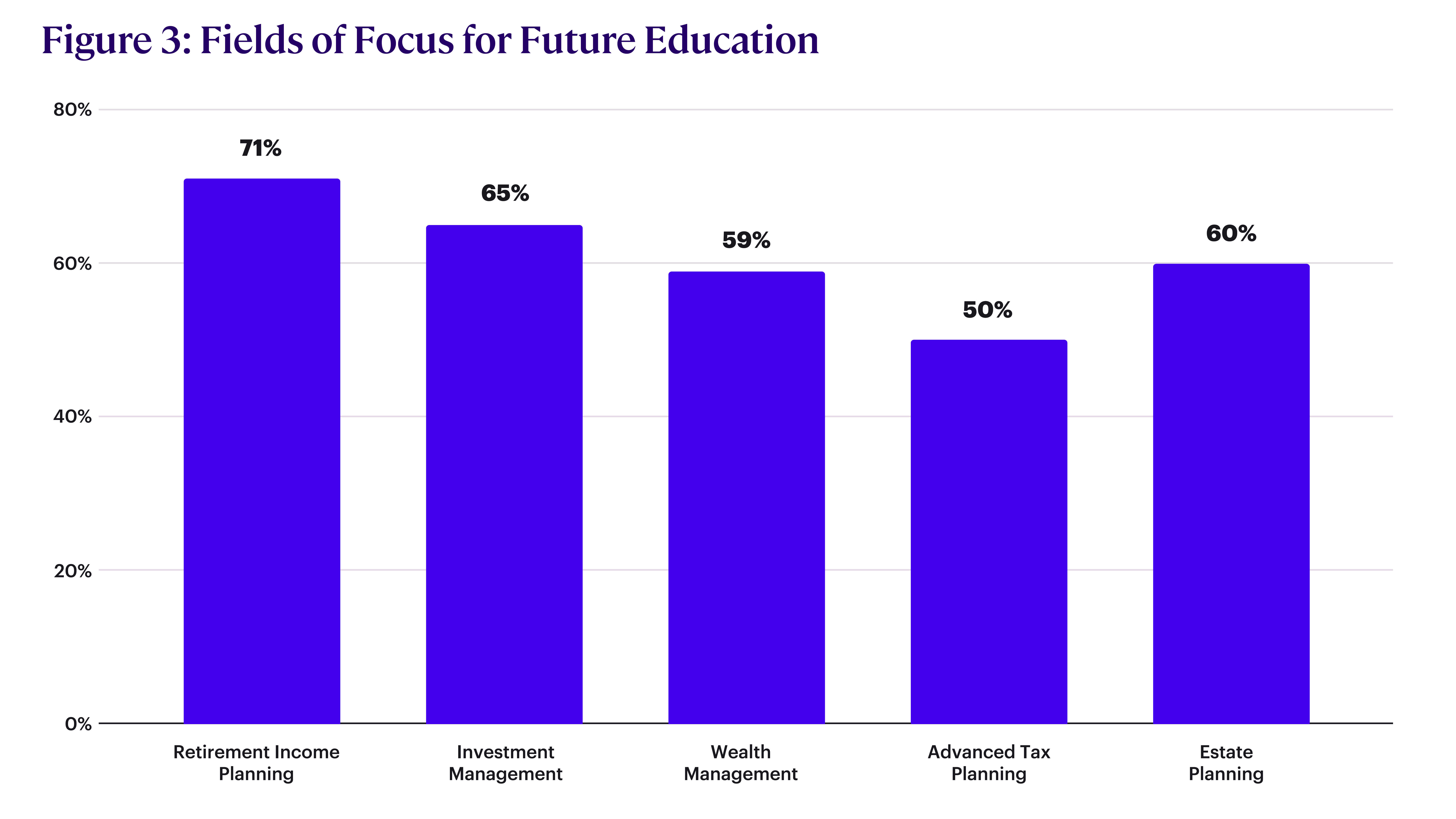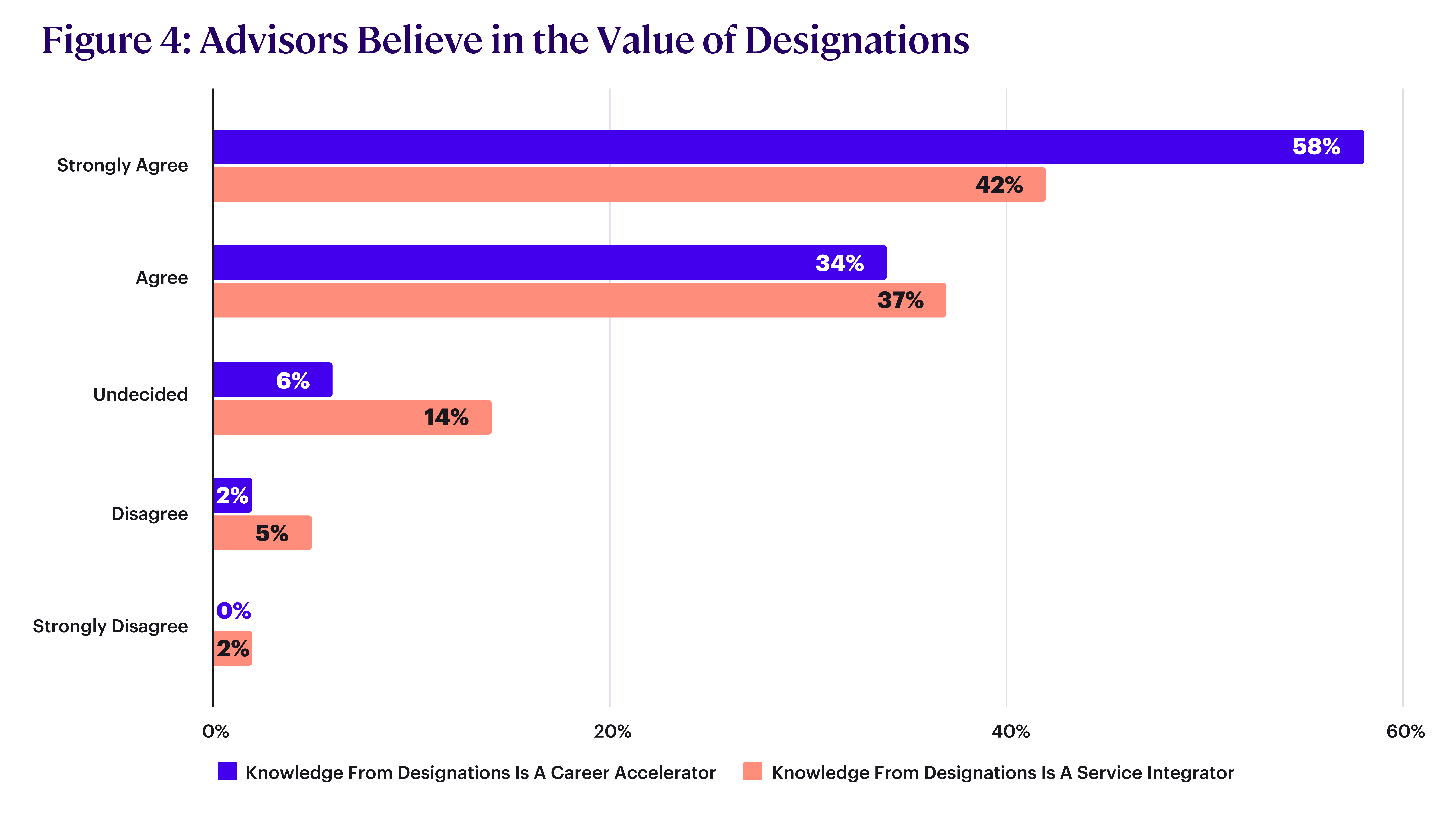RIA Growth and Specialized Knowledge Survey Results

Nearly 80% of emerging RIAs plan on hiring over the next three years, with most looking to recruit one to five new advisors (see Figure 1).

Emerging RIAs are also concerned with broader business growth (see Figure 2).

RIAs See Value in the Right Education
Given that growth is a priority, what do RIAs see as a core pathway to achieving it? For most, it is a combination of education and specialization: Importance of further education: 76% of surveyed advisors desire further education on topics important to their clients. Value of specialization: Advisors identified retirement income planning, investment management, wealth management, advanced tax planning, and estate planning as their preferred fields of focus for future education (see Figure 3).

RIAs Accelerate Their Careers with Designations
Most advisors (92%) believe that designations have a positive impact on their careers, and 79% think that designations support further service integration (see Figure 4).

Designations, including those available in The College's ChFC®, CLU®, and RICP® Programs, are a key career accelerator for ambitious advisors and can help drive organic growth.
For more insights, download a summary of the survey now.
Diversity, Equity & Inclusion Research
Advisors’ Perceptions of Success Study
With FINRA statistics finding that just as many advisors enter the business as enter it every year, the perception of financial services as a field that’s hard to break into and even harder to find success in has become embedded not only in the minds of the public, but also within financial services professionals themselves. Newcomers to the business comment on the competitive nature of the field and how they are sometimes encouraged to outdo, rather than collaborate with, their fellow professionals to “get ahead.”
When it comes to improving retention rates of strong talent in financial services, such focus is put on how advisors can become successful that attention is not often paid to what it takes for financial advisors to feel successful. This emotional validation is just as important as data-reinforced evidence, as multiple studies have shown employees who feel a sense of professional accomplishment and achievement in their jobs are happier at work in the long run. Because of this, the industry’s usual benchmarks for success – assets under management (AUM), increased production numbers, or higher premiums – are only a small part of the equation and insufficient to justify the challenging nature of joining the field.
In early 2022, the American College Center for Women in Financial Services surveyed over 800 financial advisors, asking them to self-evaluate their level of success based on both objective criteria and their subjective, personal definitions of success. The results showed that while most advisors consider themselves “successful,” the factors that drive that belief differ across demographics and require specialized and thoughtful approaches for recruitment, development, and retention of those advisors.
Perceptions of Success: An Overview
Encouragingly, 7 in 10 advisors surveyed by the Center for Women in Financial Services self-identified as “successful,” indicating a confident workforce mostly meeting employers’ business goals. 60% of respondents also indicated they primarily entered the financial services industry “to serve/help others,” showing a genuine desire to provide valuable guidance and benefit society.
Among the most important influences in achieving professional success, respondents cited “trust,” “individual effort,” and “specialized knowledge” – especially that gained through designation programs like The College’s – as key factors. However, the implications of these factors begin to diverge when looking at the demographic data.
The Demographic Divide
Among those surveyed by the Center for Women, major differences arose between male and female advisors' perceptions of success. Despite consistently meeting established business goals, more women than men (34% to 22%) identified as being “less successful,” demonstrating a potential lack of confidence among women in financial services as to their professional progress.
On the flip side, however, women were much more likely to view themselves as successful in the first 4-10 years of their practice than men (72% to 57%). This divergence could be explained by a greater emphasis on competition in the socialization of men compared to women, which could make men feel less successful than they really are when using their peers as a benchmark for their success.
When asked what factors were most instrumental to their success, men and women once again seemed to diverge. Men emphasized the importance of individual effort; women, meanwhile, assigned higher importance to communication, community support, and marketing.
Business Impacts and Implications
Overall, the results of the Center for Women’s survey indicated larger teams of advisors might enjoy more widespread feelings of success than smaller ones or individual advisors. This belief also varies by gender between different types of firms.
Women respondents tended to draw much of their strength from the support of smaller, more dedicated teams they could work with on a personal level, generating a sense of shared community that seemed key for women to be satisfied with their business and their own professional development. By contrast, men in financial services appear to derive a sense of success from overcoming the very challenges associated with working in larger, more competition-driven business models. With that said, however, individual women advisors testified to a much higher rate of success than their male peers (83% to 54%). This could indicate that despite their focus on the power of individual effort, men in the industry may also desire the same support systems women in the industry prize, including mentorship opportunities.
From the results of this study, it seems clear the financial services industry has room for continued growth and expansion of professional development programs for women – and their male counterparts. It will remain up to industry leaders to meet the moment and invest more time, money, and effort into making these important resources available to developing financial professionals of all demographics.
Download the research here.
Ethics In Financial Services Research
Toward a Perspective of Stakeholder Culture in the Financial System
Stakeholders in the financial industry—including financial firms, consumers, regulators, and emerging stakeholders like the tech industry and social media—increasingly acknowledge the importance of working together to improve the industry and prevent future crises. Yet their actions do not reflect their pro-stakeholder rhetoric and self-interest remains paramount.
A study commissioned for the American College Cary M. Maguire Center for Ethics in Financial Services argues that one key reason for stakeholders’ failure to work together may be their problematic beliefs.
The tables below summarize some of the persistent, negative beliefs that financial system stakeholders hold. Overall, they see one another in competitive, rather than collaborative terms. Consumers and regulators believe that financial firms are motivated by greed and blind to others’ needs, while financial firms and other powerful players see their role in terms of driving growth and generating profit rather than building a system that works for everyone.
These antagonistic beliefs undermine stakeholder relations. Mutual mistrust and the absence of a sense of shared responsibility mean that stakeholders approach one another with suspicion and try to dominate rather than collaborate. As a result, the financial system remains vulnerable and fails to serve everyone’s interests.
The current financial system incurs high costs in financial failures and from low trust. Improving the situation will require key stakeholders to rebuild relations and develop a sense of shared destiny.
Financial firms and professionals can start by:
- Better understanding the “blind spots” that bias how they perceive their roles and the roles of other actors.
- Finding overlapping areas of self-interest with other stakeholders to develop a vision of common interest.
- Creating a roadmap of coordinated action to tackle shared problems across critical areas.
- Agreeing on more productive behavior patterns, especially toward transparent and timely knowledge and information sharing.
- Finding new reporting and governance mechanisms to hold each other accountable.
The study also explores:
- How financial firms’ competitive orientation may undermine their credibility and informal influence over consumers.
- Why financial firms prefer to retain power rather than pursuing shared interests, even at the expense of consumer trust and the risk of more regulation.
- The impact that emerging stakeholders like social media, tech companies, and others may have on traditional financial system dynamics.